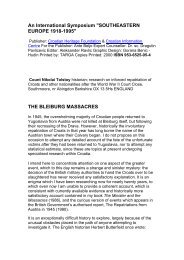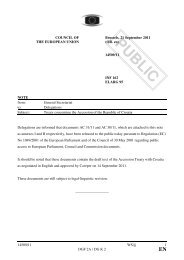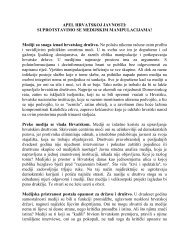Timeline: Croatia - A Chronology of key events - Croatia, the War ...
Timeline: Croatia - A Chronology of key events - Croatia, the War ...
Timeline: Croatia - A Chronology of key events - Croatia, the War ...
Create successful ePaper yourself
Turn your PDF publications into a flip-book with our unique Google optimized e-Paper software.
BBC http://news.bbc.co.uk/2/hi/europe/1097156.stm<br />
(latest access 24 November 2011)<br />
<strong>Croatia</strong>, <strong>the</strong> <strong>War</strong>, and <strong>the</strong> Future<br />
http://www.inavukic.com<br />
committed by Yugoslav antifascists during and after<br />
WWII in former Yugoslavia.)<br />
1946-1962<br />
Communist party under <strong>the</strong> anti-fascist banner has<br />
power in Federative People’s Republic <strong>of</strong> Yugoslavia.<br />
Majority <strong>of</strong> <strong>key</strong> positions in politics, in <strong>the</strong> army and <strong>the</strong><br />
economy are held by Serbian nationals.<br />
The country’s state borders are closed, and tens <strong>of</strong><br />
thousands <strong>of</strong> <strong>Croatia</strong>ns flee <strong>the</strong> borders into<br />
neighbouring countries’ refugee camps (Italy, Austria,<br />
Germany...). Those caught by <strong>the</strong> Yugoslav border<br />
patrols are sent to prison or killed.<br />
1961/1962 – Yugoslavia opens its state borders.<br />
Emigration is now possible. Over <strong>the</strong> ensuing years<br />
hundreds <strong>of</strong> thousands <strong>of</strong> <strong>Croatia</strong>ns emigrate ei<strong>the</strong>r in<br />
family reunion, economic or political reasons.<br />
1971<br />
People’s movement <strong>Croatia</strong>n Spring. Mass movement<br />
in <strong>Croatia</strong> calling for more rights for <strong>Croatia</strong> within<br />
Yugoslavia.<br />
Demands included: greater civil rights for <strong>Croatia</strong>n<br />
citizens, <strong>the</strong> right to take pride in <strong>Croatia</strong>’s history, <strong>the</strong><br />
abolishment <strong>of</strong> Serbo-<strong>Croatia</strong>n language and <strong>the</strong> right<br />
to speak/write ei<strong>the</strong>r in <strong>the</strong> <strong>Croatia</strong>n OR in <strong>the</strong> Serbian<br />
language, due representation on all major posts in<br />
Yugoslavia, proportional to population within <strong>the</strong><br />
Federation.<br />
(By 1969 Serbs held 73.6% <strong>of</strong> <strong>key</strong> positions in <strong>the</strong><br />
Yugoslav administration although <strong>the</strong>ir due<br />
representation was to be 39.6%/ <strong>Croatia</strong>ns held 8.6%<br />
although <strong>the</strong>ir due representation was to be 22%.<br />
At <strong>the</strong> <strong>of</strong>ficers <strong>of</strong> <strong>the</strong> Yugoslav People’s Army/JNA<br />
structure <strong>the</strong>re was 62.5% Serbs and 10.4% <strong>of</strong> Croats.<br />
This overwhelming inequity suffered distrust due to<br />
nationalistic leanings.<br />
Although <strong>Croatia</strong> was <strong>the</strong> largest earner [at least 50%<br />
<strong>of</strong> foreign currency entering Yugoslavia] among <strong>the</strong> 6<br />
states <strong>of</strong> Yugoslavia it used only 16.5% while Serbia<br />
used 46.6%)<br />
Yugoslav Army siege was installed in Zagreb, <strong>the</strong><br />
capital <strong>of</strong> <strong>Croatia</strong>. Many involved in <strong>the</strong> <strong>Croatia</strong>n<br />
Spring, including university students, were persecuted,<br />
tortured in police cells, and imprisoned.<br />
Public ga<strong>the</strong>rings <strong>of</strong> more than two people were<br />
prohibited for months; historical <strong>Croatia</strong>n folksongs<br />
prohibited.









